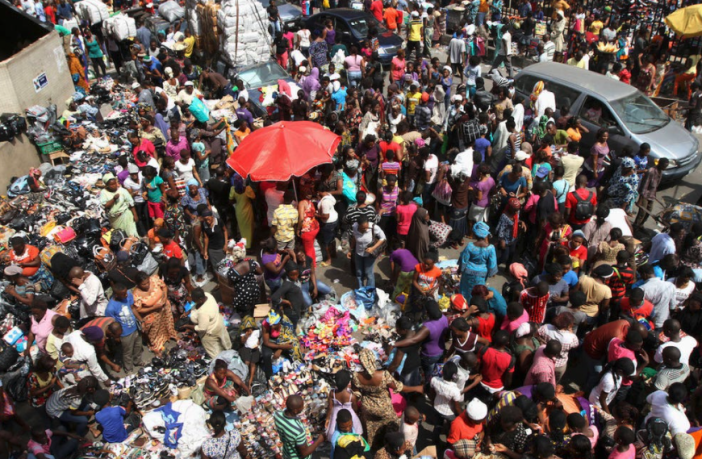- If the continent is to capitalise on the benefits of urbanisation, cities must prepare for weather-driven migration.
While urbanisation has development benefits, most of Africa’s city dwellers already live in poverty – and this is likely to increase as climate change worsens.
While only 43% of its population live in cities, Africa is the fastest urbanising continent. In 1960, only 20% of Africans lived in cities. By 2050 that figure will have risen to an estimated 60%. Africa’s overall population is projected to double by 2050, with two-thirds of that growth (an additional 950 million people) occurring in cities.
Historically, urbanisation hasn’t reduced poverty in Africa – instead, it has increased
Historically, urbanisation hasn’t reduced poverty in Africa – instead, it has increased. Up to 70% of the continent’s urban population live in ‘slum’ conditions. This is partly due to relative wealth levels and a lack of economic transformation to match urbanisation rates. At 40% urban, sub-Saharan Africa had a per capita GDP of US$1 018 in 2013 – compared to US$1 806 in the Middle East and North Africa; $US1 860 in Latin America and the Caribbean; and US$3 500 in Asia.
Climate migrants moving from declining rural areas are often dispossessed and shift from one poverty situation (rural) to another (urban slums). They live in already overcrowded and insecure informal settlements that lack sufficient electricity, water and sanitation services.
Many end up in areas that are vulnerable to environmental hazards, such as floodplains. Poor land-use practices and building materials also trap heat and contribute to the urban heat island effect. Rising temperatures and populations in already crowded spaces put communities at risk from the growing number of heatwaves.
South Africa is urbanising quickly. Currently, 67% of people live in urban areas, up from 54% in 1994. It’s projected that by 2050, South Africa’s population will have increased by 23.6 million people, with 62% of that growth expected to be in cities.
However existing urbanisation models don’t account for climate-linked migration, and it’s hard to predict the trends. The nexus between climate change and migration is complex. People move for various reasons, and climate change is a threat multiplier. It’s difficult to isolate environmental factors as migrants often cite ‘economic’ reasons for moving, even if ecological degradation or disaster was the underlying cause.
Existing urbanisation models don’t account for climate-linked migration and predicting trends is hard
Most irregular migrants move to cities, and many reside in informal settlements where locals already face high unemployment rates and poor access to services. Many locals perceive migrants as competition for scarce resources, which frequently leads to xenophobic violence.
Climate impacts are escalating in South Africa and neighbouring countries and are projected to worsen. Between 1960 and 2021, mean annual temperatures in South Africa have increased by twice the global average (0.7°C). They are expected to increase by between 1°C and 3°C by 2050, depending on mitigation (efforts to reduce emissions).
Hot and cold extremes have increased, and rainfall seasonality has changed. Heatwaves are more frequent and dry spells last longer. As a result, crop yields in Southern Africa are decreasing and livestock losses have become more frequent. Food insecurity and food prices have increased, while vector- and waterborne diseases have grown in number and intensity.
These factors severely lessen agricultural productivity in a region that relies heavily on rain-fed farming and has less of the infrastructure needed to moderate climate change impacts. These include early warning systems, crop alternatives, improved irrigation and flood barriers. This could drive even more urbanisation inside South Africa and from neighbouring countries.
Preparing for climate-driven migration will cost governments much less than allowing it to continue unplanned
Despite calls for more attention and funding, adaptation has received little attention in South Africa and existing plans are under-implemented. Recent Institute for Security Studies research found that current frameworks didn’t adequately account for the links between climate change and migration, or the adaptation measures needed to address these links.
South Africa’s response to climate change overall has been delayed and splintered. Poor alignment and policy coherence, limited human and financial resources and a shortage of relevant skills are key challenges. South Africa is making slow progress towards climate change objectives and needs to show more political will.
Positive signs include President Cyril Ramaphosa’s December 2020 appointment of a Climate Change Coordinating Commission to map the route to net zero emissions by 2050 and address mitigation and adaptation. In April 2021, he participated in the G7 Leaders’ Summit in the United Kingdom and called climate change ‘the most pressing issue of our time.’ And in September, cabinet approved the 2018 Climate Change Bill, which will be tabled in Parliament in November.
To capitalise on the benefits of urbanisation and minimise climate change risks, weather-driven migration should be factored into the design and construction of urban spaces. This will protect investments and have significantly lower economic and social costs than allowing it to continue unplanned.
Author: Aimée-Noël Mbiyozo, Senior Research Consultant, Migration, ISS Pretoria
This article was first publsihed by the Institute for Security Studies (ISS) and is republished with permission. Link to original article here.
Disclaimer: The articles and videos expressed in this publication are those of the authors. They do not purport to reflect the opinions or views of Green Building Africa, our staff or our advertisers. The designations employed in this publication and the presentation of material therein do not imply the expression of any opinion whatsoever on the part Green Building Africa concerning the legal status of any country, area or territory or of its authorities.















